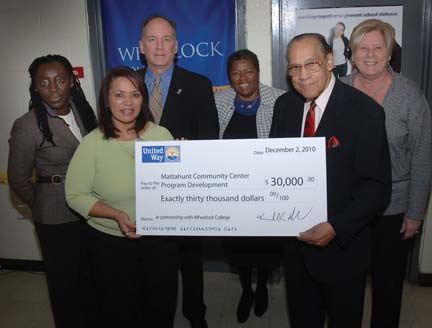June 16, 2011
 Mattahunt School and Community Center
Mattahunt School and Community Center
The Mattahunt Community Center is hard to find if you’ve never been there. It’s tucked away in a heavily residential section of Mattapan and shares a leafy campus with the middle school of the same name.
Chances are, most people — even those who live in Mattapan— have never been there unless they have kids who go to school at the Mattahunt or they vote in one of the two precincts that use the school as a polling place.
That’s all about to change.
Last spring, the Boston Center for Youth and Families opted to shut down the Mattahunt as a way to avoid “duplication of services” and to improve programming at other city-run centers. The move was met with great skepticism and rightly so. The shut-down was abrupt and the future of the Mattahunt center — along with other shuttered BCYF facilities— was murky at best. There was only vague talk of partnering with non-profits to offer new services to the community. The situation was so uncertain that many in Mattapan simply thought that the center would be mothballed permanently.
Instead, the city agency was fortunate to find a willing partner in a college whose campus is well beyond the borders of Mattapan: Wheelock College. Its president— Jackie Jenkins-Scott— has taken a keen interest in serving Mattapan and building the college’s relationships in city neighborhoods. Under her leadership — and with Mayor Tom Menino’s encouragement — Wheelock agreed to take on the Mattahunt project last year.
This week, Wheelock and a task force commissioned late last year made up largely of Mattapan residents released a final report outlining the future of the Mattahunt facility. The document itself is an impressive recounting of the last seven months of work that have gone into the planning process. If the report is any indication of what is to come under Wheelock’s leadership, the people of Mattapan will be very pleased with the new incarnation of the Mattahunt center.
The task force, co-chaired by longtime Mattapan civic leader Gareth Kincaid and Wheelock’s Marta Rosa, details the many physical plant needs still facing the facility. In particular, it notes that the building needs a new roof (which is funded in the current city budget for FY12) and major improvements to its swimming pool.
Critically, the task force took the important step of surveying the broader community about its wants and needs. The pool itself is a key element to the center’s re-use, as a majority of adults surveyed for the study — along with most youth— identified swimming as a key programming option they want to see met in the center. The center also needs to be wired for Internet and smartphone use — two key missing links that kept Mattahunt from meeting its full potential under city control.
This partnership with Wheelock College is likely to become a model for transitioning other city-owned community centers into privately managed facilities. And that’s a good thing. It must be noted that, to date, no one else has come close to matching the commitment that Wheelock has shown thus far in Mattapan. Here’s hoping that other non-profit institutions take a close read of Wheelock’s work to date and follow its lead.
Congratulations to President Jenkins-Scott, her team, and the volunteer committee of Mattapan residents and stakeholders who took on the important work of the last several months. A full version of the report they produced can be viewed online at wheelock.edu/mattahunt.
Tags:
Villages:
Topics:


